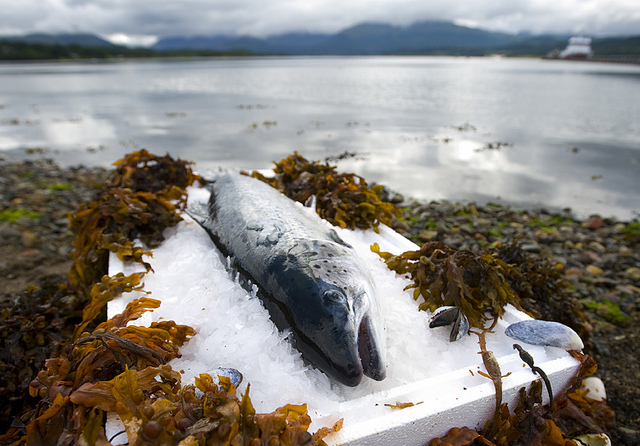Here’s a downer. The McNeil government appears to be slipping into the rut the NDP government was in. That rut got it turfed out of office: sudden herky-jerky decisions out of central command, no one consulted, the public rattled and things blowing up. You’ve heard the to-do over film credits, university governance and sudden cuts to community groups. And now this one is back: our old friend the open-pen salmon issue.
After painstaking study, the Doelle-Lahey panel acknowledged that the critics — which include the fishing and tourism industries as well as environmentalists and a broad swath of community groups — have plenty of reasons to be concerned about these operations.
Although it disappointed some critics in not calling for an outright ban on open-pen feedlots — instead, giving the industry the chance to redeem itself with better practices in future — it outlined a regulatory process to gain public trust and move the industry forward, which would include a stakeholder advisory committee on regulations and a scientific one to keep the government abreast of the science.
As the various interested parties eagerly awaited the next move and its promised consultation and transparency, what they got instead was a sudden announcement in April by Fisheries Minister Keith Colwell, camouflaged under news coverage of the federal budget, of new legislation — Bill 95 — that would be fast-tracked and would contain only a fraction of the Doelle-Lahey recommendations.
Notably, veterinary records would be off-limits to freedom of information requests — a rank move to prevent the public and fishermen from being upset by the chemicals and medications used in feed, against lice and as defouling agents in these operations.
Meanwhile, the Harper government is being helpful by trashing the Fisheries Act. Two years ago, Glenn Cooke, CEO of the dominant player, Cooke Aquaculture, and other company officials pleaded guilty in a New Brunswick court to using an illegal pesticide that killed untold amounts of lobster larvae and were fined $500,000. It’s a sleazy business, but not to worry in future. Under the Harper changes, chemicals toxic to lobster will be legal.
The minister also announced that leaseholders of some 160 dormant sites would be asked to activate them as early as this summer. Forget about consultation.
And an “administrator” would be named to oversee the whole thing — which sounds to some like industry running itself, like pulp company clearcutters running forest policy. What about the stakeholder and scientific advisory committees? Cornered on CBC Radio, Colwell mumbled unconvincingly that they were coming. And no determination of zones where open pens might be acceptable or not, as Doelle-Lahey recommended.
Not to worry, says the minister. The bill is one thing, but the specific regulations are yet to come. The stakeholder community is hoping that there is indeed something to be salvaged as the regulations roll out, but suspicions are high that the fix is in.
Last December, Premier Stephen McNeil angrily and rightly called on Cooke to return a chunk of the $25 million gifted to it by the former NDP government, since none of the promised jobs had materialized. Why, then, this apparent turnaround? Is it indeed our politics off the rails again? Is Cooke still wining and dining our politicians — which is how this whole thing got started in the first place? Or has it something to do with the obtuse belief, deep in the Halifax establishment in particular, that opposition to open pens is all “not in my backyard” nonsense, sheer progress-busting negativity, a failure to “be bold?”
Indeed, even if you consider objections to shoreline fouling, pesticides in the ocean, threats to wild salmon and other marine life, sludge in the sea currents, dead zones under cages and diseased fish on the market as so much whining, consider the economics. For our $25 million we were supposed to get a processing plant in Shelburne, a hatchery in Digby and an expanded fish-feed mill in Truro. A processing plant — while established South Shore fish processors can’t get enough workers and are shipping product elsewhere! Indeed, if there was a running plant, it would be closed now because all the South Shore fish were killed off by “superchill” last winter and infectious salmon anemia is cyclically rampant (in New Brunswick, production is down 40 per cent because of sea lice). Besides, salmon farming is notoriously easy to mechanize. Jobs are declining, not increasing, wherever processing takes place. In other words, the promise of jobs is a lie for gullible politicians.
As for the other facilities that Cooke would have expanded at public expense, its already-excessive influence over aquaculture in Nova Scotia generally means that other operators, even in an unconnected field like shellfish, don’t dare criticize Cooke publicly.
So with this hot issue, as with others, is the McNeil government flubbing it?
In repeating the mistakes of the NDP, what this government is not getting, says Raymond Plourde, in charge of the salmon file at the Ecology Action Centre, is that “the public wants in.”
How many governments must bite the dust before that can happen?
Ralph Surette is a veteran freelance journalist living in Yarmouth County. This article was first published in the Chronicle Herald.



